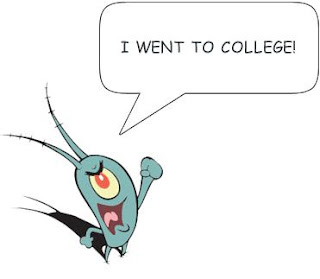TLP: Helps When You’ve Got Those Student Loans To Pay Back, Too
Courtesy of Jr. Deputy Accountant
In this economy, a college degree is not all it once was.
The Washington Post checked on what some recent graduates are doing, or not doing, with their diplomas:
Armed with a bachelor’s degree in theology from Notre Dame, Adam Osielski was pondering a route well traveled: law school.
He watched his friends work long hours as paralegals while studying law and weighed the all-encompassing commitment. That was five years ago. Today, Osielski, 29, is a journeyman electrician rather than a law firm associate. Or, as Osielski might say with his minor in French, an électricien.
In a region in which 47 percent of Washington area residents have a college degree, the highest rate in the nation, Osielski is among a small but apparently growing number of the college-educated who are taking up the trades.
They started out studying aerospace engineering, creative writing and urban planning. But somewhere on the path to accumulating academic credentials, they decided that working with their hands sounded more pleasant — and lucrative — than a lot of white-collar work. So bye-bye to term papers and graduate theses, and hello to apprenticeships to become plumbers, electricians, auto mechanics and carpenters.
For Osielski, the attraction was natural. After graduating from Notre Dame, he spent two years in Haiti working with a charity building schools, but he wasn’t allowed to do the one task that seemed most intriguing: wiring the electricity.
When he returned from Haiti, he began working as a furniture mover in the District to pay the bills and discovered the satisfaction that comes with an empty truck at the end of a day. A legal career seemed too much like drudgery.
"I have friends my age who are just deciding to go to graduate school," said Osielski, who graduated this month from an apprenticeship program run by the International Brotherhood of Electrical Workers Local 26 in Lanham. "I’m glad to be already working and developing a career."
And paying taxes, spending, maybe even saving a little. Meanwhile, the college grads looking at professional careers can compete with the laid-off and downsized. Good luck with that.



